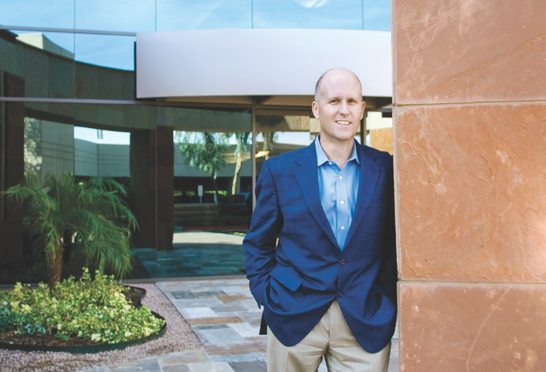When the goal is to carve out a spot on the cutting edge of green-energy technology, it helps to be in the business of making blades.
That’s the case with TPI Composites Inc., a privately held company now headquartered in Scottsdale that devotes a significant portion of its business to manufacturing massive wind-turbine blades used by such clients as Mitsubishi Power Systems and GE Energy. TPI Composites, which is also involved in the transportation and military vehicle markets, employs about 2,800 worldwide and operates facilities that house about 1.1 million square feet of manufacturing floor space in the United States, Mexico and China.
“Wind energy is our largest business,” says Steven Lockard, president and CEO. “It’s the business that is expanding at the most rapid pace.”
That expansion, which represents around 80 percent of the company’s annual sales, is indicative of an industry that has experienced unprecedented growth in recent years.
Lockard sees wind energy as a clean, reliable source of electricity and job creation, two areas addressed frequently in recent election campaigns.
“Three or four years ago when we had meetings in Washington, oftentimes we were trying to convince people that wind could become big enough to matter one day,” he says. “And that’s no longer the case.”
It matters now. In 2007, the domestic wind-energy industry expanded its power-generating capacity by 45 percent, installing 5,244 megawatts of wind power, according to the American Wind Energy Association. That accounted for about 30 percent of the nation’s new power-producing capacity and represented $9 billion injected into the economy. Through three quarters of 2008, wind power was on pace to add 7,500 megawatts by year’s end.
And when it comes to job creation, TPI Composites plays a vital role. A newly opened 316,000-square-foot manufacturing plant in Newton, Iowa, is expected to employ about 500 workers when it reaches full capacity. That is a welcomed development in a town hit hard by job losses when its Maytag Corp. plant closed down in 2007.
Although Lockard is optimistic about the long-term prospects for wind energy, he is also realistic about the short term, suggesting the industry may continue to be impacted by the capital crisis through, at least, the first part of 2009. His observations are exclusive to wind energy, an industryenjoying record gains of late, but there may be a warning here for other high-tech businesses dealing with current financial conditions.
“We would expect to see perhaps more modest growth (in 2009) … not the same degree of growth that we’ve been experiencing the last few years,” Lockard says.




